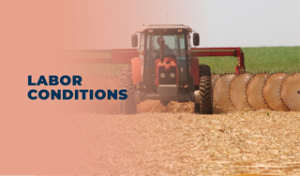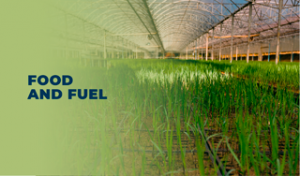RENOVABIO
Launched in 2017, the National Biofuels Policy (RenovaBio) is a key tool in reducing greenhouse gas emissions and helping Brazil fulfill its commitments under the Paris Climate Agreement. With the expansion of the domestic sustainable biofuels market, from production to utilization of cleaner fuels, RenovaBio suports the substitution of fossil fuels. the program went into effect in December 2019.
THE PROGRAM
![]() Guided by annual goals, the program is expected to prevent the release of more than 600 million tons of CO2 into the atmosphere over the next 10 years, by increasing the use of renewable fuels in the transport matrix.
Guided by annual goals, the program is expected to prevent the release of more than 600 million tons of CO2 into the atmosphere over the next 10 years, by increasing the use of renewable fuels in the transport matrix.
To join the program, mills must have their production process audited, including the origin of their biomass, which must respect the zero deforestation policy. Based on the audit and product lifecycle, an energy environmental efficiency score (NEEA) is generated. The more efficient and sustainable the production, the higher the NEEA.
Based on the NEEA score, which is validated by the National Agency for Petroleum, Natural Gas and Biofuels (ANP), the producing units are allowed to generate Decarbonization Credits (CBIOs). In the case of ethanol, for example, companies with less carbon intensity need around 650 liters of biofuel to generate one Decarbonization Credit, which is an exchange-tradable security. Under the program, any agent (individual or legal entity) can buy CBIOs on the stock exchange. RenovaBio obligate fuel distributors to purchase these securities, as they must meet individual emission reduction targets. These targets take into account the volume of fossil fuel traded by the distributor.
Participation in RenovaBio is not restricted to Brazilian biofuel producers. International producers can also join the program as long as they complete the production certification process.
SUSTAINABILITY – THE BRAZILIAN EXPERIENCE
WHAT IS CBIO?
The Decarbonization Credit (CBIO) is the main asset to promote greenhouse gas emissions reduction in the transport sector in Brazil. Each credit represents one ton of CO2 equivalent that was prevented from being emitted by fossil fuel.
Being an exchange-tradable security, the CBio will allow biofuel production in Brazil to be even more sustainable, with investments in new technologies and efficiency.
The credit can be used by anyone as a way of neutralizing their CO2 emissions.
Q&A
RENOVABIO
What is RenovaBio?
RenovaBio is the new National Biofuel Policy, instituted by Law No. 13576/2017, created to serve parts of Brazil’s Nationally Determined Contributions (NDCs) under the Paris Agreement. Its goal is to reduce the carbon intensity of the Brazilian transportation matrix by expanding the use of biofuels and creating a carbon credit market to offset emissions of greenhouse gases by fossil fuels. RenovaBio includes ethanol, biodiesel, biomethane, biokerosene, second-generation ethanol, among others. The policy also serves to improve the country’s energy security.
How does it work?
RenovaBio establishes long-term guidelines that recognize the capacity of each biofuel to reduce emissions, individually and by production unit.
10-year goals: Emission reduction targets for transport are defined over a 10-year period. The target provides predictability of the volumetric need for fuels (both fossil and renewable) over the period, allowing private agents to make investment plans with more certainty. National targets are broken down into anual sub-targets, that are mandatory for all fuel distributors, based on their participation in the fossil fuel market.
Life-cycle assessment (LCA): Emission levels are based on life-cycle analysis, expressed in parameters defined by the National Agency of Petroleum, Natural Gas and Biofuels (ANP) in Resolution No. 758/2018. The certification of biofuel production is audited by private inspection firms, based on data provided by RenovaCalc, that assigns an environmental energy efficiency score (NEEA) for each production unit. Producers who produce energy with lower CO2eq emissions in the productive life-cycle therefore get higher scores. The score will accurately reflect the individual contribution of each producer to the mitigation of a specific amount of greenhouse gases, in comparison to its fossil substitute (tons of CO2eq).
The score based on the certification process serves as a parameter for issuing a decarbonization credit in the market. This credit represents the reduction of one ton of CO2eq derived from the consumption of the renewable source compared to fossil. It can be traded by any agent (individual or legal entity), and compliance with emission reduction targets is the responsibility of the fuel distributors as they must purchase the credit issued by renewable source producers.
Who manages RenovaBio?
Whereas the Ministry of Mines and Energy (MME) is responsible for regulating the CBIO market in Brazil, the RenovaBio Committee and the National Energy Policy Council (CNPE) are responsible for defining both the targets and guidelines for decarbonizing the fuel matrix. The National Agency of Petroleum, Natural Gas and Biofuels (ANP) is responsible for placing safeguards in the eligibility of certifying firms, validating invoices as CBIO collaterals, individualizing targets among distributors, and overseeing implementation at the end of each year, applying penalties to companies, should they have purchased an insufficient volume of securities.
When are annual targets announced? Are they reviewed every year?
National targets are broken down into individual targets on a yearly basis and made for all fuel distributors, in accordance with their participation in the fossil fuel market in the previous year. The definitive annual individual target for each fuel distributor is published on March 31, as established by Resolution No. 791/2019. National emissions reduction targets for the fuel matrix are defined over a 10-year period by CNPE.
What is a CBIO? How is it priced?
A CBIO is a decarbonization credit that is equivalent to one tonne of carbon prevented from entering into the atmosphere. CBIOs are issued by the biofuel producer accredited by ANP after production is sold. CBIO are traded on the B3 exchange and can be acquired by any individual or legal entity wishing to neutralize their CO2 emissions.
What is the step-by-step process for engaging with Renovabio from different perspectives?
The biofuel producer must hire an inspection firm accredited by ANP to audit the carbon footprint of its production process. The analysis of the life cycle of products is then used to reach the energy environmental efficiency (known as NEEA unde its portuguese acronym) scores of production units, that are submitted to ANP for validation. The Agency is obliged to make the report available under 30 days for public hearing, should any questions arise. Once the validity of the NEEA is recognized, the producer is able to issue CBIOs after selling biofuel in the physical market and submitting the invoices as collateral to the security. The security is registered by financial institutions and made available for sale on the exchange. Distributors acquire CBIOs to meet their targets thereby “retiring” CBIOs with the ANP to effectively offset CO2 emissions.
Can a foreign national buy and trade CBIOs?
Decarbonization credits are traded in an organized market. The bookkeeper (financial institution) is responsible for keeping records of the chain of deals that take place while the securities are registered on the exchange. Any agent (individual or legal entity) can acquire CBIOs by simply contacting one of the brokers selling them. The trade is then registered on the exchange. The buyer may sell the security in the future (acting as speculator) or retire it (using the security to neutralize emissions).
Is the biofuel certification process globally recognized? Could it work for other regions with biofuel production?
Yes. The certification process is supported by an analysis of the lifecycle of products to quantify the intensity of carbon derived from the production process of each agent. These calculations are made using the RenovaBio calculator, known as RenovaCalc. This methodology used for the analysis is well-known and accepted worldwide.
Does RenovaBio also pursue other objectives, for example waste reduction, water use or pesticides?
Good management practices are reflected in the producer’s energy efficiency score. The purpose of the program is to encourage production processes with lower carbon intensity. For example, the replacement of chemical fertilizers by organic options or by vinasse (residue from ethanol production) leads to lower CO2eq emission and reduces water consumption.
Because vinasse can be used to produce biogas for energy consumption by the mill itself or for sale and distribution into the wider energy matrix, that also paves the way for issuing CBIOs. In sum, RenovaBio recognizes and encourages agricultural and environmental best practices and the circular economy practices in sugarcane production.
Towards Decarbonization of Liquid Fuel in Japan
Japan has announced its plans to introduce E10 bending by 2030, as a strategy to decarbonize its transport sector.
News

New Blog Post : “Towards Decarbonization of Liquid Fuel in Japan ” by Mr. Yoshihiko Omori
New blog post on our website, authored by Mr. Yoshiko Omori, Director at the Institute of Energy Economics, Japan (IEEJ).

Sugarcane harvest for the first half of June 2025
Sugar production reached 2.45 million tons in the first half of June 2025, while ethanol production reached 1.78 billion liters.
Brazil Office
Sao Paulo
Phone: +55 (11) 3093-4949
E-mail: unica@unica.com.br
Europe Office
Brussells
Phone: +32 (0) 2 2110535
E-mail: brussels@unica.com.br






